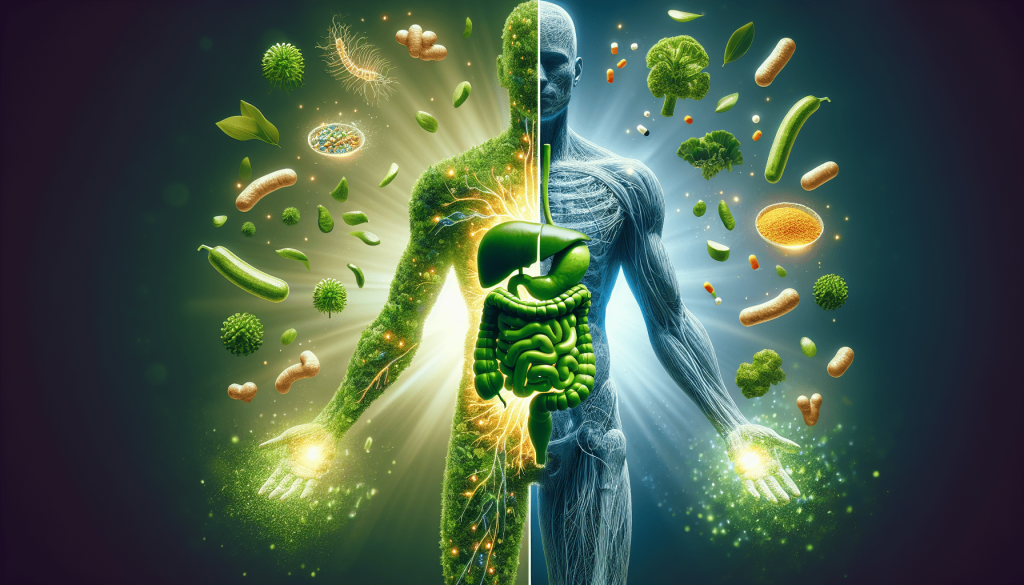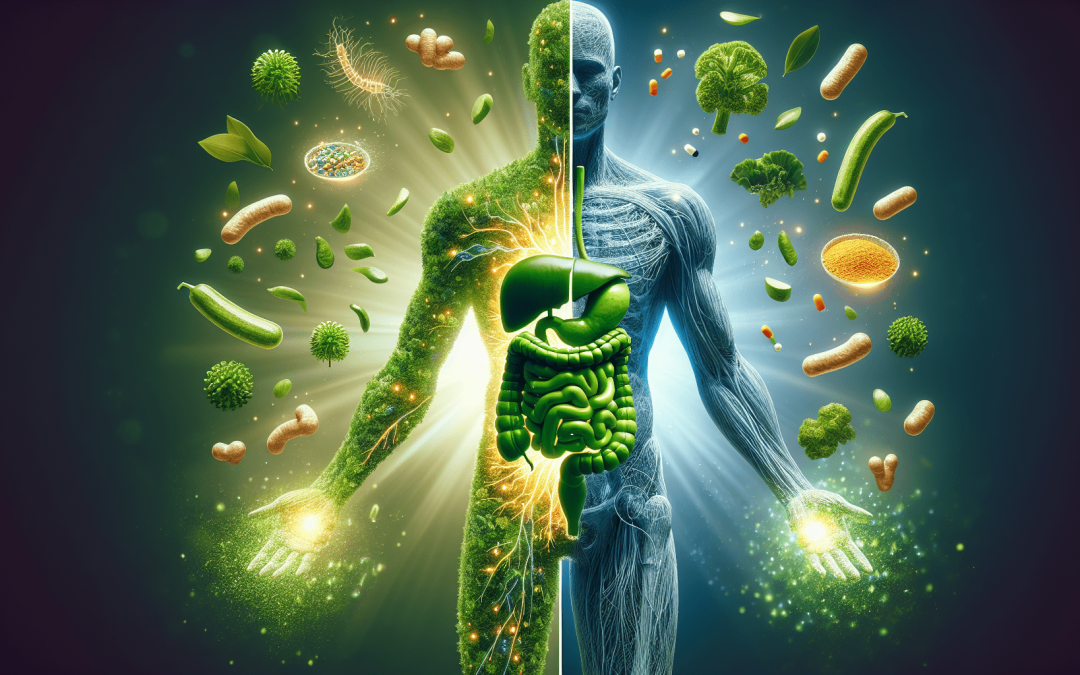You may not realize it, but the health of your gut plays a crucial role in how well your body absorbs essential nutrients. Your gut, often referred to as the second brain, is home to trillions of bacteria that work together to support digestion and overall well-being. In this article, we will explore the fascinating link between gut health and nutrient absorption, shedding light on how a healthy gut can optimize the nutrients you consume and ultimately enhance your overall health. Get ready to discover the power of a well-functioning gut and how it can positively impact your body’s ability to absorb and benefit from the nutrients it needs to thrive.
What is Gut Health?
Gut health refers to the overall well-being of your digestive system, specifically focusing on the balance of bacteria and other microorganisms that reside in your gut. The health of your gut is crucial as it plays a significant role in various bodily functions, ensuring that your body can effectively break down and absorb nutrients, support your immune system, and even affect your mental health.
Microbiome
At the core of gut health is the microbiome, which refers to the collection of microorganisms that inhabit your digestive system. The microbiome is comprised of trillions of bacteria, viruses, fungi, and other microorganisms that work together symbiotically. These microorganisms play a vital role in maintaining a healthy gut and are responsible for many functions, including supporting digestion, producing certain vitamins, and regulating the immune system.
Intestinal Flora
Intestinal flora, also known as gut flora, is the specific community of microorganisms that reside in your intestines. This community of microorganisms is highly diverse and unique to each individual. It helps to break down food, absorb nutrients, and contributes to the overall health and balance of your digestive system.
Digestive System
The digestive system is a complex network of organs and processes that work together to break down food and absorb nutrients. It consists of various components, including the mouth, esophagus, stomach, small intestine, large intestine, and anus. Each of these organs plays a specific role in the digestion and absorption of nutrients, highlighting the importance of gut health in overall well-being.
The Importance of Gut Health
Maintaining a healthy gut is crucial for several reasons, as it directly impacts your overall health and well-being. Here are a few key reasons why gut health is important:
Nutrient Absorption
One of the primary roles of the gut is to absorb nutrients from the food we consume. A healthy gut ensures efficient nutrient absorption, which is essential for providing our bodies with the necessary vitamins, minerals, and other nutrients needed for optimal functioning. When the gut is not in good health, it may struggle to absorb essential nutrients, leading to potential deficiencies and health issues.
Immune System Support
Believe it or not, a significant portion of your immune system is located in your gut. The gut serves as a barrier against harmful pathogens and toxins, playing a crucial role in immune defense. When the gut is in good health, it helps to support a strong immune system, preventing the invasion of harmful bacteria and viruses. On the other hand, an unhealthy gut can weaken the immune system, making you more susceptible to infections and illnesses.
Mental Health
It may come as a surprise, but there is a strong connection between the gut and the brain, often referred to as the gut-brain axis. The gut produces neurotransmitters such as serotonin, which is often associated with mood regulation. A healthy gut is essential for maintaining optimal mental health, as imbalances in gut bacteria have been linked to mood disorders such as anxiety and depression. Taking care of your gut health can play a significant role in supporting your overall mental well-being.

Factors Influencing Gut Health
Several factors can influence the health of your gut. While some may be beyond your control, others are within your power to change. Here are some factors that can impact your gut health:
Diet
The food you eat plays a massive role in determining the health of your gut. A diet rich in fiber, whole grains, fruits, and vegetables provides essential nutrients and fuels the growth of beneficial gut bacteria. On the other hand, a diet high in processed foods, sugars, and unhealthy fats can disrupt the balance of gut bacteria and contribute to an unhealthy gut.
Stress
Stress can have a profound effect on your gut health. When you are stressed, your body releases stress hormones that can negatively impact the balance of bacteria in your gut. This disruption can lead to digestive issues such as bloating, indigestion, and even inflammation. Incorporating stress management techniques such as meditation, yoga, or regular exercise can help support a healthy gut.
Antibiotics
While antibiotics are necessary for treating infections, they can also have unintended consequences on your gut health. Antibiotics target both harmful and beneficial bacteria, often disrupting the delicate balance in your gut microbiome. This disruption can lead to digestive issues and an increased risk of developing antibiotic-resistant bacteria. It is important to only take antibiotics when necessary and to follow prescribed instructions carefully.
Exercise
Regular physical activity not only benefits your overall health but also plays a role in maintaining a healthy gut. Exercise can help promote regular bowel movements, stimulate the growth of beneficial bacteria, and reduce stress levels. Incorporating moderate-intensity exercise into your routine, such as brisk walking or cycling, can contribute to a healthier gut.
How Gut Health Affects Nutrient Absorption
A healthy gut is essential for efficient nutrient absorption. Here are a few ways in which gut health impacts nutrient absorption:
Intestinal Barrier Function
The intestines have a lining of mucosal cells that form a barrier to prevent harmful substances from entering the bloodstream. When the gut microbiome is imbalanced or damaged, this barrier function can be compromised. This can lead to a condition known as “leaky gut syndrome,” where toxins, undigested food particles, and bacteria leak into the bloodstream. This condition can interfere with the absorption of nutrients and potentially lead to inflammation and other health issues.
Microbial Metabolism
The bacteria in your gut play a significant role in breaking down food and extracting nutrients. Certain strains of gut bacteria are more effective at metabolizing specific nutrients, such as carbohydrates, proteins, and fats. When the balance of gut bacteria is disrupted, it can impact the efficiency of nutrient metabolism, potentially leading to malabsorption and deficiencies.
Short-Chain Fatty Acids
The gut bacteria are responsible for producing short-chain fatty acids (SCFAs), which have been shown to support nutrient absorption. SCFAs help regulate the pH of the gut, promote the absorption of minerals such as calcium and magnesium, and provide an energy source for the cells lining the intestines. A healthy gut with a diverse community of bacteria is essential for the production of these beneficial fatty acids.
The Role of Probiotics and Prebiotics in Gut Health
Probiotics and prebiotics are two types of substances that can positively impact gut health when incorporated into your diet.
Probiotics
Probiotics are live bacteria that provide health benefits when consumed in adequate amounts. These beneficial bacteria can help restore and maintain a healthy balance in the gut microbiome. They can be found in fermented foods such as yogurt, sauerkraut, kefir, and kimchi. Probiotic supplements are also available, offering a convenient way to incorporate these beneficial bacteria into your daily routine.
Prebiotics
Prebiotics are a type of fiber that serves as food for the beneficial bacteria in your gut. They help promote the growth and activity of these bacteria, supporting a healthy gut microbiome. Foods rich in prebiotics include garlic, onions, bananas, asparagus, and whole grains. By including these foods in your diet, you can provide the necessary nourishment for the beneficial bacteria in your gut.
Foods that Promote Gut Health
Including certain foods in your diet can significantly contribute to maintaining a healthy gut. Here are three categories of foods that promote gut health:
Fiber-Rich Foods
Fiber is essential for a healthy gut as it provides nourishment for the beneficial bacteria in your digestive system. Foods such as fruits, vegetables, whole grains, legumes, and nuts are excellent sources of fiber. Aim to include a variety of fiber-rich foods in your meals to support a diverse and thriving gut microbiome.
Fermented Foods
Fermented foods are rich in probiotics, which are beneficial bacteria that help support a healthy gut. Foods such as yogurt, kefir, sauerkraut, kimchi, and kombucha contain live bacteria that can help restore and maintain a balanced gut microbiome. Including fermented foods in your diet can provide a natural source of probiotics.
Omega-3 Fatty Acids
Omega-3 fatty acids, found in fatty fish such as salmon, mackerel, and sardines, have anti-inflammatory properties and can help reduce inflammation in the gut. Including these sources of omega-3 fatty acids in your diet can support a healthy gut and overall well-being.

The Impact of Poor Gut Health on Nutrient Absorption
When the gut is not in good health, it can result in various issues related to nutrient absorption. Here are a few potential impacts of poor gut health:
Malabsorption
An unhealthy gut can struggle to effectively absorb nutrients from the food you consume. This can lead to malabsorption, where essential vitamins, minerals, and other nutrients are not adequately absorbed by the body. Malabsorption can result in deficiencies, even if you are consuming a nutrient-rich diet.
Deficiencies
Poor gut health can contribute to deficiencies in essential nutrients such as vitamins, minerals, and amino acids. These deficiencies may manifest as symptoms such as fatigue, weakness, poor wound healing, and impaired immune function. Ensuring a healthy gut can help prevent these deficiencies and support optimal nutrient absorption.
Digestive Disorders
Chronic gut issues such as irritable bowel syndrome (IBS), Crohn’s disease, and ulcerative colitis can impact nutrient absorption. These digestive disorders can lead to inflammation, damage to the intestinal lining, and disruption of the gut microbiome, all of which can interfere with the absorption and utilization of nutrients.
How to Improve Gut Health
Improving gut health is within your control and can have a significant impact on your overall well-being. Here are some strategies to enhance your gut health:
Balanced Diet
Aim to consume a balanced diet rich in fiber, whole foods, fruits, vegetables, and lean proteins. Limit the intake of processed foods, sugars, unhealthy fats, and alcohol. Emphasize foods that are rich in prebiotics and include fermented foods to promote a healthy gut microbiome.
Reducing Stress
Stress can negatively impact gut health, so incorporating stress management techniques is essential. Practice relaxation techniques such as meditation, deep breathing exercises, or engaging in activities you enjoy. Find healthy outlets to manage stress and create a balanced lifestyle.
Avoiding Antibiotics (when unnecessary)
While antibiotics are sometimes necessary, avoid taking them when unnecessary. If prescribed antibiotics, follow the instructions carefully and consider incorporating probiotics into your routine to replenish beneficial bacteria. Only take antibiotics when recommended by a healthcare professional.
Regular Exercise
Engage in regular physical activity to support a healthy gut. Exercise helps stimulate digestion, encourages regular bowel movements, and reduces stress levels. Find activities you enjoy and make them a part of your routine for optimal gut health.

The Connection Between Gut Health and Overall Well-Being
Taking care of your gut health can have a profound impact on your overall well-being. Here are a few ways gut health is connected to other aspects of your health:
Improved Digestion
A healthy gut supports efficient digestion, minimizing issues such as bloating, gas, and constipation. When your gut is in optimal health, you can experience improved digestion and regular bowel movements, resulting in increased comfort and well-being.
Enhanced Immune Function
As mentioned earlier, a significant portion of your immune system is located in the gut. A healthy gut supports a strong immune system, helping to fend off harmful pathogens and minimizing the risk of infections and illnesses.
Better Mental Health
The gut-brain axis highlights the strong connection between gut health and mental well-being. An imbalanced gut microbiome has been linked to mood disorders such as anxiety and depression. Taking care of your gut health can positively impact your mental health, promoting emotional well-being and reducing the risk of mental health issues.
Conclusion
Maintaining a healthy gut is crucial for optimal overall well-being. From nutrient absorption to immune system support and mental health, a healthy gut plays a vital role in many aspects of our lives. By paying attention to our diet, managing stress, avoiding unnecessary antibiotics, and staying physically active, we can take steps towards improving our gut health. Incorporating foods that promote gut health, such as fiber-rich foods, fermented foods, and omega-3 fatty acids, can further support a thriving gut microbiome. Remember, a healthy gut leads to a healthier you!
Related Content
- 10 Effective Tips for a Body Detox at Home in 2025: The Ultimate Guide
- The Ultimate 2025 Guide to Natural Detoxification Support: 7 Effective Tips
- The Secret To A Successful Natural Detox At Home
- The Ultimate Guide to Herbal Detox: What Works?
- Ultimate Guide to 10 Effective Organic Detox Tea Tips for 2025








